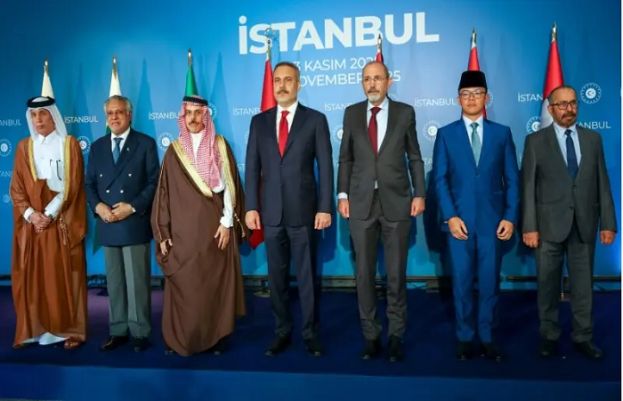Gaza’s future must be determined and led by Palestinians themselves, Turkey and six key Muslim nations declared on Monday following high-level talks in Istanbul — warning against any new form of external control over the war-ravaged territory. Turkey, which played a pivotal role in brokering the now fragile three-week-old ceasefire, urged Muslim countries to use their collective influence in shaping Gaza’s reconstruction and long-term stability. “Our clear principle is that Palestinians should govern themselves and ensure their own security,” Turkish Foreign Minister Hakan Fidan said at a post-meeting news conference. “The international community should support this in the best possible way — diplomatically, institutionally, and economically. No one wants to see a new system of tutelage emerge.” The October 10 ceasefire, brokered by US President Donald Trump to end two years of relentless fighting, has remained uneasy amid renewed Israeli strikes and reports of Palestinian attacks on Israeli forces. The Istanbul meeting brought together foreign ministers from Saudi Arabia, Qatar, the United Arab Emirates, Jordan, Pakistan, and Indonesia — all of whom were previously consulted by Trump in September during the UN General Assembly before he unveiled his Gaza peace plan. “We’ve now reached a critical juncture,” Fidan said. “We do not want the genocide in Gaza to resume.” He added that all seven nations supported allowing Palestinians to take full control of Gaza’s security and governance. Fidan, who met over the weekend with a Hamas delegation led by chief negotiator Khalil al-Hayya, said the group was “ready to hand Gaza’s administration to a Palestinian committee.” He also voiced optimism that ongoing reconciliation talks between Hamas and the West Bank-based Palestinian Authority “will bear fruit soon,” adding that unity between Palestinian factions would “strengthen Palestine’s position within the international community.” Earlier, Turkish President Recep Tayyip Erdoğan said Hamas was “committed to upholding the ceasefire agreement” and called on Muslim nations to take “a leading role” in Gaza’s recovery and reconstruction. “We believe the reconstruction plan prepared by the Arab League and the OIC (Organisation of Islamic Cooperation)should be implemented immediately,” he said of the plan unveiled in March. Task force needs UN mandate Turkey has been instrumental in backing Hamas, whose October 7, 2023 attack on Israel sparked the war in Gaza. Fidan said it was crucial that the emerging International Stabilisation Force that will monitor the Gaza ceasefire under Trump’s plan, have a “mandate defined by a UN Security Council resolution and a framework for legitimacy”. Washington is currently working with Arab and international partners to decide on the composition of the force, with Turkey hoping to play a role, despite fierce opposition from Israel. “The countries we’ve spoken with say they will decide whether to send troops based on … the ISF’s mandate and authority,” Fidan said. “First, a general consensus needs to be reached on a draft, then it needs to be approved by the members of the Security Council. “And it needs to be free from vetoes by any of the permanent (UNSC) members,” he said of a blocking move frequently used by key Israel ally Washington. Israel has long viewed Turkey’s diplomatic overtures with suspicion over Ankara’s close ties with Hamas and adamantly opposes it joining the task force that is meant to take over after Israeli troops withdraw from Gaza. A Turkish disaster relief team, sent to help efforts to recover the remains of those trapped under the rubble — including Israeli hostages seized by Hamas — has been stuck at the border because of Israel’s refusal to let them in, according to Ankara.
Turkey, Muslim allies back Palestinian self-governance as key to Gaza’s future

